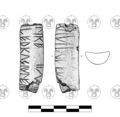SZ-22 antler: Difference between revisions
Sindy Kluge (talk | contribs) No edit summary |
Sindy Kluge (talk | contribs) No edit summary |
||
| Line 12: | Line 12: | ||
|source=Mayr 1956b: 246; Zemmer-Plank et al. 1985: 166 (cat. No. 41) | |source=Mayr 1956b: 246; Zemmer-Plank et al. 1985: 166 (cat. No. 41) | ||
|checklevel=1 | |checklevel=1 | ||
|problem=object name, classification: haft, grip | |problem=object name, classification: haft, grip; drill on the right end??? | ||
}} | }} | ||
== Commentary == | == Commentary == | ||
Fragment probably haft of a knife or grip of a tool.<br>Semi-circular cross section; curved side smoothed, flat side not worked, therefore rough. On both ends broken at which one end is slivered. Three longitudinal grooves as well as horizontal crenations in the area of this end.<br>On the curved side an [[index::SZ-22.1|inscription]] in two lines; on the flat side [[index::SZ-22.2|characters]].<br>Doubts in matters of the material. The literature, e.g. {{bib|Franz 1957}}: 107 fn. 19, who contradicts directly the statement of Mayr, {{bib|Zemmer-Plank et al. 1985}}: 166, and {{bib|Nothdurfter 2002}}: 1151, characterises it as made of bone. The [[index::Tiroler Landesmuseum Ferdinandeum|museum]] as well as {{bib|Mayr 1956b}}: 246 describe the object as made of antler.<br>Also various interpretations related to the function: {{bib|Zemmer-Plank et al. 1985}}: 166, as well as {{bib|Nothdurfter 2002}}: 1151 note it as haft or grip; the [[index::Tiroler Landesmuseum Ferdinandeum|museum]] identifies it with a votive offering and {{bib|Mayr 1956b}}: 246 indicates the two suggestions as possible.<br>According to Mancini the object was found in two pieces in November 1908 in Sanzeno ({{bib|LIR}}: 93).<br>'''To reflect''': Probably the primary function as haft or grip, later votive offering and therefore the characters respectively the inscription on the flat side | Fragment probably haft of a knife or grip of a tool.<br>Semi-circular cross section; curved side smoothed, flat side not worked, therefore rough. On both ends broken at which one end is slivered. Three longitudinal grooves as well as horizontal crenations in the area of this end.<br>On the curved side an [[index::SZ-22.1|inscription]] in two lines; on the flat side [[index::SZ-22.2|characters]].<br>Doubts in matters of the material. The literature, e.g. {{bib|Franz 1957}}: 107 fn. 19, who contradicts directly the statement of Mayr, {{bib|Zemmer-Plank et al. 1985}}: 166, and {{bib|Nothdurfter 2002}}: 1151, characterises it as made of bone. The [[index::Tiroler Landesmuseum Ferdinandeum|museum]] as well as {{bib|Mayr 1956b}}: 246 describe the object as made of antler.<br>Also various interpretations related to the function: {{bib|Zemmer-Plank et al. 1985}}: 166, as well as {{bib|Nothdurfter 2002}}: 1151 note it as haft or grip; the [[index::Tiroler Landesmuseum Ferdinandeum|museum]] identifies it with a votive offering and {{bib|Mayr 1956b}}: 246 indicates the two suggestions as possible.<br>According to Mancini the object was found in two pieces in November 1908 in Sanzeno ({{bib|LIR}}: 93).<br>'''To reflect''': Probably the primary function as haft or grip, later votive offering and therefore the characters respectively the inscription on the flat side | ||
{{bibliography}} | {{bibliography}} | ||
Revision as of 09:36, 4 March 2014
| Object | |
|---|---|
| Classification: | handle |
| Material: | antler |
| Size: | length 5.7 cm, width about 1.9 cm, thickness about 1.0 cm |
| Condition: | fragmentary |
|
| |
| Site: | Sanzeno (Trento, Trentino-Alto Adige, Italy) |
| Coordinates (approx.): | 46° 21' 57.60" N, 11° 4' 30.00" E [from site] |
| Find date: | November 1908 |
| Current location: | Tiroler Landesmuseum Ferdinandeum (on exhibition) |
| Inventory Nr.: | 13.454 |
|
| |
| Inscriptions: | |
|
| |
| Sources: | Mayr 1956b: 246 Zemmer-Plank et al. 1985: 166 (cat. No. 41) |
Images
|
|
Commentary
Fragment probably haft of a knife or grip of a tool.
Semi-circular cross section; curved side smoothed, flat side not worked, therefore rough. On both ends broken at which one end is slivered. Three longitudinal grooves as well as horizontal crenations in the area of this end.
On the curved side an inscription in two lines; on the flat side characters.
Doubts in matters of the material. The literature, e.g. Franz 1957: 107 fn. 19, who contradicts directly the statement of Mayr, Zemmer-Plank et al. 1985: 166, and Nothdurfter 2002: 1151, characterises it as made of bone. The museum as well as Mayr 1956b: 246 describe the object as made of antler.
Also various interpretations related to the function: Zemmer-Plank et al. 1985: 166, as well as Nothdurfter 2002: 1151 note it as haft or grip; the museum identifies it with a votive offering and Mayr 1956b: 246 indicates the two suggestions as possible.
According to Mancini the object was found in two pieces in November 1908 in Sanzeno (LIR: 93).
To reflect: Probably the primary function as haft or grip, later votive offering and therefore the characters respectively the inscription on the flat side
Bibliography
| Franz 1957 | Leonhard Franz, "Südtiroler Reitia-Inschriften", Der Schlern 31 (1957), 105–109. |
|---|---|
| LIR | Alberto Mancini, Le Iscrizioni Retiche [= Quaderni del dipartimento di linguistica, Università degli studi di Firenze Studi 8–9], Padova: Unipress 2009–10. (2 volumes) |
| Mayr 1956b | Karl M. Mayr, "Hirschhornvotive aus den rätischen Bergen", Der Schlern 30 (1956), 245–246. |
